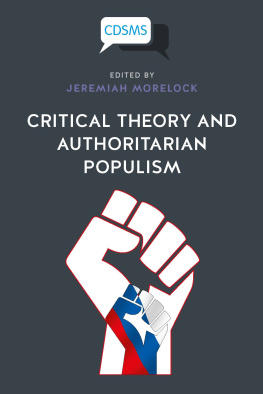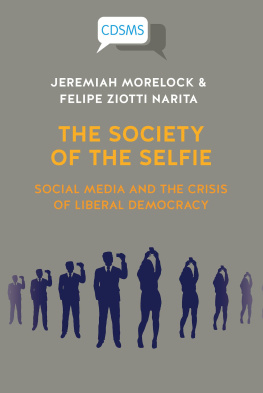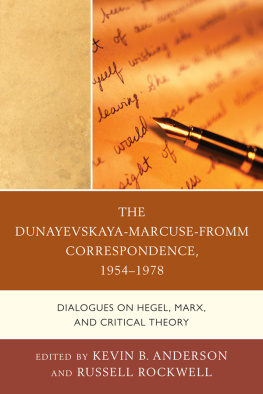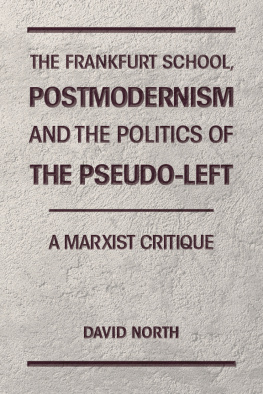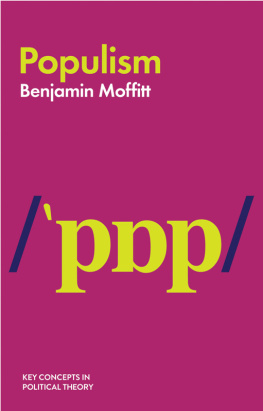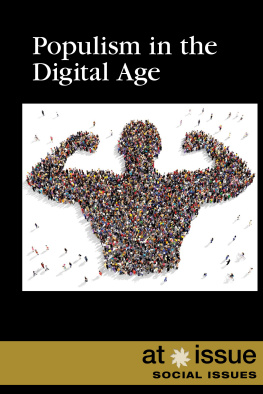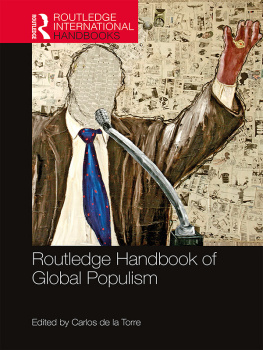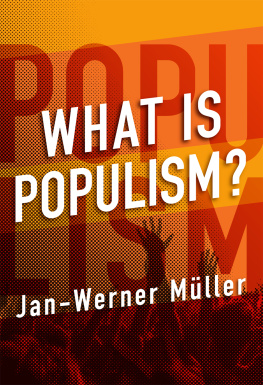Contents
Critical Theory and Authoritarian Populism
edited by Jeremiah Morelock
Critical, Digital and Social Media Studies
Series Editor: Christian Fuchs
The peer-reviewed book series edited by Christian Fuchs publishes books that critically study the role of the internet and digital and social media in society. Titles analyse how power structures, digital capitalism, ideology and social struggles shape and are shaped by digital and social media. They use and develop critical theory discussing the political relevance and implications of studied topics. The series is a theoretical forum for internet and social media research for books using methods and theories that challenge digital positivism; it also seeks to explore digital media ethics grounded in critical social theories and philosophy.
Editorial Board
Thomas Allmer, Mark Andrejevic, Miriyam Aouragh, Charles Brown, Eran Fisher, Peter Goodwin, Jonathan Hardy, Kylie Jarrett, Anastasia Kavada, Maria Michalis, Stefania Milan, Vincent Mosco, Jack Qiu, Jernej Amon Prodnik, Marisol Sandoval, Sebastian Sevignani, Pieter Verdegem
Published
Critical Theory of Communication: New Readings of Lukcs, Adorno, Marcuse, Honneth and Habermas in the Age of the Internet
Christian Fuchs
https://doi.org/10.16997/book1
Knowledge in the Age of Digital Capitalism: An Introduction to Cognitive Materialism
Mariano Zukerfeld
https://doi.org/10.16997/book3
Politicizing Digital Space: Theory, the Internet, and Renewing Democracy
Trevor Garrison Smith
https://doi.org/10.16997/book5
Capital, State, Empire: The New American Way of Digital Warfare
Scott Timcke
https://doi.org/10.16997/book6
The Spectacle 2.0: Reading Debord in the Context of Digital Capitalism
Edited by Marco Briziarelli and Emiliana Armano
https://doi.org/10.16997/book11
The Big Data Agenda: Data Ethics and Critical Data Studies
Annika Richterich
https://doi.org/10.16997/book14
Social Capital Online: Alienation and Accumulation
Kane X. Faucher
https://doi.org/10.16997/book16
The Propaganda Model Today: Filtering Perception and Awareness
Edited by Joan Pedro-Caraana, Daniel Broudy & Jeffery Klaehn
https://doi.org/10.16997/book27
Critical Theory and Authoritarian Populism
Edited by
Jeremiah Morelock

University of Westminster Press
www.uwestminsterpress.co.uk
Published by
University of Westminster Press
115 Cavendish Street
London W1W 6UW
www.uwestminsterpress.co.uk
Text the editors and several contributors 2018
First published 2018
Cover: ketchup productions. Series concept: Mina Bach.
Printed in the UK by Lightning Source Ltd.
Print and digital versions typeset by Siliconchips Services Ltd.
ISBN: (Hardback): 978-1-912656-04-2
ISBN (PDF): 978-1-912656-05-9
ISBN (EPUB): 978-1-912656-06-6
ISBN (Kindle): 978-1-912656-07-3
ISBN (Paperback): 978-1-912656-21-9
DOI: https://doi.org/10.16997/book30
This work is licensed under the Creative Commons Attribution-NonCommercial-NoDerivatives 4.0 International License. To view a copy of this license, visit http://creativecommons.org/licenses/by-CC-BY-NC-ND/ or send a letter to Creative Commons, 444 Castro Street, Suite 900, Mountain View, California, 94041, USA. This license allows for copying and distributing the work, providing author attribution is clearly stated, that you are not using the material for commercial purposes, and that modified versions are not distributed.
The full text of this book has been peer-reviewed to ensure high academic standards. For full review policies, see: http://www.uwestminsterpress.co.uk/site/publish/
Suggested citation:
Morelock, J. (ed.). 2018. Critical Theory and Authoritarian Populism.
London: University of Westminster Press. DOI: https://doi.org/10.16997/book30. License: CC-BY-NC-ND
To read the free, open access version of this book online, visit https://doi.org/10.16997/book30 or scan this QR code with your mobile device: | 
|
Acknowledgements
Thanks are extended to the following publishers: to Logos journal, for permitting the publication of updated and extended versions of John Abromeits Critical Theory and the Persistence of Right-Wing Populism and Douglas Kellners Donald Trump as Authoritarian Populist: A Frommian Analysis, both from volume 15, issues 23, 2016, at http://logosjournal.com/2016-vol-15-nos-2-3/; to Sense Publishers, for additional permissions on the Kellner piece, the Logos version of which also appears in Kellners American Nightmare: Donald Trump, Media Spectacle, and Authoritarian Populism , 2016; and to Yale University Press, for permission to reprint the Modernity chapter from Stephen Eric Bronners The Bigot: Why Prejudice Persists , 2014.
I cannot thank enough the members of the Critical Theory Research Network, without whom this volume would not have come together. I would also like to thank Douglas Kellner, Christian Fuchs and Andrew Lockett for reviewing early drafts of the introduction and providing helpful comments. Lastly, I thank the department of sociology at Boston College, especially Zine Magubane and Stephen Pfohl.
Competing interests
The editors and contributors declare that they have no competing interests in publishing this book.
Contents
Douglas Kellner
Jeremiah Morelock
John Abromeit
Lars Rensmann
Samir Gandesha
Douglas Kellner
Stephen Eric Bronner
Charles Reitz
Jeremiah Morelock and Felipe Ziotti Narita
Christian Fuchs
Panayota Gounari
Forrest Muelrath
Preface to Critical Theory and Authoritarian Populism
Douglas Kellner
Since the Brexit referendum in U.K., the election of Donald Trump in the 2016 U.S. election, and the rise of right-wing populist movements throughout the globe, there has been intense focus on authoritarian populism on a global scale. The articles collected in this volume carry out a Frankfurt School critique of authoritarian populism, dealing with Trump, various right-wing populist movements in Europe, Latin America, and throughout the globe. The contributors make use of classic Frankfurt School Critical Theory to address contemporary populism and especially its authoritarian varieties as an important phenomenon and threat in the contemporary moment, using key ideas and theorists of the Frankfurt School to interpret and provide a critique of Trump and the Trump phenomenon, as well as authoritarianism in its varied contemporary forms.
In 1950, Max Horkheimer and Theodor W. Adorno helped to assemble a volume titled The Authoritarian Personality , which constructed a psychological and sociological profile of the potentially fascistic individual (Adorno et al. 1950). The work was based on interviews largely with American workers, and the cumulative racist, antidemocratic, paranoid, and irrational sentiments in the case studies suggested that there were dangers of fascism in the United States, and since that day there have been many studies of authoritarianism in U.S. politics, a study intensified in the contemporary era of authoritarian populism.
Around the same period as The Authoritarian Personality , Leo Lwenthal and Norbert Guterman published in 1949 Prophets of Deceit , which studied Father Coughlin and other rabble-rousers of the era, envisaging the possibility that a situation will arise in which large numbers of people would be susceptible to his psychological manipulation, thus anticipating a Prophet of Deceit and conman like Donald Trump!

